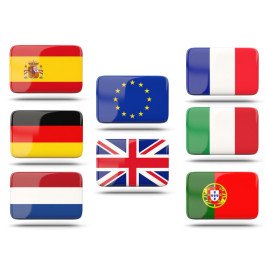Traveling Smart: How to Protect Your Data and Privacy Abroad
Traveling opens up a world of new experiences, but it also exposes your data and privacy to various risks. As more travelers rely on digital devices and internet connectivity, the importance of protecting personal information cannot be overstated. From public Wi-Fi vulnerabilities to device theft, the threats are real and can lead to severe consequences.
At Wraptel, we understand these challenges and offer solutions like our international data SIM cards to help safeguard your digital life while exploring the globe. This article will guide you through essential steps to protect your data and privacy, ensuring a secure and enjoyable travel experience.
Understanding the Risks
Travelers face multiple data risks abroad, ranging from public Wi-Fi vulnerabilities to outright cyberattacks. Public Wi-Fi, often available in cafes, airports, and hotels, is a common target for hackers who can easily intercept data transmitted over these networks. This makes it crucial to understand that not all Wi-Fi networks are secure. Additionally, device theft and loss are significant concerns. Losing your device can result in unauthorized access to sensitive information stored on it. Cyberattacks and malware are other major threats, as hackers can deploy malicious software to steal data or monitor your activities without your knowledge.
Real-life examples of data breaches while traveling highlight the severity of these risks. For instance, in 2018, a major hotel chain experienced a breach that exposed the personal information of 500 million guests. The consequences of compromised data include financial loss, identity theft, and a tarnished reputation. Understanding these risks is the first step toward mitigating them.
Pre-Travel Preparations

Before you embark on your journey, securing your devices and data is essential. Start by updating your software and apps to ensure you have the latest security patches. Installing reputable security apps can provide additional protection against malware and unauthorized access. Always backup your data to an external drive or cloud service to prevent data loss in case your device is lost or stolen.
Protecting sensitive information involves removing unnecessary data from your devices and encrypting important files. This makes it harder for unauthorized individuals to access your information. When choosing a travel data plan, consider the benefits of using Wraptel's international data SIM cards. Our SIM cards offer reliable and secure internet connectivity, which is crucial for staying connected without compromising your data.
- Update Software and Apps: Ensure all your devices have the latest security updates.
- Install Security Apps: Use apps like Avast or Norton for added protection.
- Backup Data: Save important files to an external drive or cloud service.
- Remove Unnecessary Data: Clear out sensitive information from your devices.
- Encrypt Files: Use tools like BitLocker or VeraCrypt to encrypt important files.
Comparing data plans and selecting the best option can be daunting, but Wraptel simplifies this process by offering competitive rates and extensive coverage. Our plans are designed to meet the needs of travelers, ensuring that you stay connected securely no matter where you are.
Additionally, creating a travel-specific digital strategy can be beneficial. This includes setting up temporary emails for travel-related communications, using disposable phone numbers for online activities, and organizing a secure cloud storage system for vital documents such as passports, tickets, and travel itineraries. These steps not only protect your primary contact information but also streamline your travel experience by keeping everything in one secure location.
Safe Internet Usage Abroad

Using the internet safely while abroad is crucial for protecting your data. Secure connections are paramount, and using a Virtual Private Network (VPN) can help encrypt your internet traffic, making it difficult for hackers to intercept your data. We recommend VPN services like NordVPN or ExpressVPN for their reliability and security features.
When using public Wi-Fi, identify secure networks by looking for ones that require passwords and are provided by reputable establishments. Avoid conducting sensitive transactions, such as online banking or shopping, over public Wi-Fi to minimize the risk of data theft. Managing mobile data effectively can also enhance security. With Wraptel’s SIM cards, you can enjoy secure and reliable internet access, reducing the need to rely on potentially unsafe public Wi-Fi networks. Monitoring your data usage helps prevent unexpected charges and ensures you have sufficient data for your needs.
- Use a VPN: Encrypt your internet traffic with a reliable VPN service.
- Identify Secure Networks: Choose Wi-Fi networks from reputable sources with passwords.
- Avoid Sensitive Transactions: Refrain from online banking or shopping on public Wi-Fi.
- Monitor Data Usage: Keep track of your data consumption to avoid overages.
Beyond VPNs and secure Wi-Fi, consider using encrypted messaging apps like Signal or WhatsApp for communications. These apps provide end-to-end encryption, ensuring that your messages remain private. Additionally, disable automatic connections to public Wi-Fi networks on your devices. This prevents your phone or laptop from connecting to potentially unsafe networks without your knowledge.
When accessing websites, look for HTTPS in the URL, indicating that the site uses encryption to protect your data. Using browser extensions such as HTTPS Everywhere can automatically redirect you to the secure version of a website. Also, consider enabling two-factor authentication (2FA) on your accounts. 2FA adds an extra layer of security by requiring a second form of verification, such as a code sent to your phone, in addition to your password.
Device Security Measures

Ensuring the physical and software security of your devices is vital. Using anti-theft apps like Prey or Find My Device can help you track and recover lost or stolen devices. Keep your devices secure in public places by using locks or keeping them within sight.
Software security measures include enabling remote wipe features, which allow you to erase data from your device if it’s lost or stolen. Setting strong passwords and using biometric authentication can also enhance security. In the event of a lost or stolen device, take immediate steps such as contacting your service provider to disable the device and report the incident to local authorities. This can help recover your device and prevent unauthorized access to your data.
- Anti-Theft Apps: Install apps like Prey or Find My Device for tracking.
- Secure Devices in Public: Use physical locks and keep devices within sight.
- Enable Remote Wipe: Activate features that allow remote data deletion.
- Strong Passwords and Biometrics: Use robust passwords and enable fingerprint or facial recognition.
Moreover, consider using RFID-blocking wallets or cases to protect your credit cards and passports from electronic pickpocketing. These wallets block RFID signals, preventing thieves from scanning your cards and stealing your information. For laptops and tablets, use privacy screens that restrict the viewing angle, ensuring that only you can see the content on your screen.
Regularly check for software updates and security patches for all your devices. Hackers often exploit vulnerabilities in outdated software, so keeping your devices up to date is crucial. Additionally, use reputable antivirus software to scan for malware and viruses. Setting up automatic scans can help detect and remove threats before they cause significant damage.
Protecting Personal Information
Limiting the amount of personal information you share on social media while traveling is essential. Oversharing travel plans or current locations can make you a target for thieves or hackers. Adjusting privacy settings on social media accounts ensures that only trusted individuals can see your posts.
Handling emails and messages securely is another critical aspect. Be cautious of phishing attempts, which often appear as legitimate emails or messages but aim to steal your information. Using secure communication tools like encrypted messaging apps can protect your conversations from eavesdropping.
Consider using disposable or secondary emails and phone numbers for online activities while traveling. This reduces the risk of your primary contact information being compromised and helps maintain your privacy.
- Limit Social Media Sharing: Avoid posting detailed travel plans or locations.
- Adjust Privacy Settings: Ensure only trusted contacts can view your posts.
- Beware of Phishing: Recognize and avoid suspicious emails or messages.
- Use Encrypted Messaging Apps: Secure your conversations with apps like Signal or WhatsApp.
- Disposable Emails and Numbers: Use temporary contact information for online activities.
In addition to these measures, review and clean up your digital footprint before traveling. Remove old social media posts or accounts that you no longer use. This minimizes the amount of personal information available online that could be used against you. When booking accommodations or activities, use reputable websites and avoid sharing more information than necessary.
For added security, consider using a travel-specific email address for all bookings and confirmations. This way, if your email is compromised, your primary email remains secure. Using burner phone numbers for online forms or temporary services can also help protect your privacy.
Dealing with Security Incidents

Identifying and responding to suspicious activities promptly can prevent further damage. If you notice unusual activities on your accounts or devices, take immediate action by changing passwords and enabling additional security measures. In case of a suspected breach, contact your service providers for assistance.
Knowing the steps to take if you suspect a breach is crucial. This includes contacting local authorities to report the incident and seeking cyber support to resolve any issues. Prompt action can help mitigate the impact of a security incident and protect your data.
- Monitor Account Activities: Regularly check for unusual activities.
- Change Passwords: Update passwords immediately if you suspect a breach.
- Contact Service Providers: Seek assistance from your mobile and internet service providers.
- Report to Authorities: Inform local authorities about any security incidents.
Additionally, document the incident and any actions taken. Keeping a detailed record can be helpful when dealing with authorities or insurance companies. If your device is stolen, providing the serial number and other identifying information can aid in recovery efforts.
Post-Travel Data Management
After your trip, reviewing and updating your security settings is essential to ensure ongoing protection. Conducting a thorough security audit of your devices can help identify and address any vulnerabilities that may have arisen during your travels.
Steps for Post-Travel Data Management
- Review and Update Security Settings: Check all security settings on your devices and accounts. This includes updating passwords, enabling two-factor authentication (2FA), and reviewing privacy settings on social media and other online accounts.
- Conduct a Security Audit: Perform a comprehensive check of your devices for any malware or suspicious activities. Use reputable antivirus software to scan for threats and remove any malicious files. Ensure that your operating systems and apps are updated with the latest security patches.
- Back Up Data: Create new backups of your data once you are back. This ensures that any new information or changes made during your trip are safely stored. Consider using both physical (external hard drives) and cloud storage solutions for redundancy.
- Analyze and Reflect on Security Practices: Take time to evaluate the effectiveness of the security measures you implemented during your trip. Identify any weaknesses or areas for improvement and adjust your practices accordingly for future travels.
- Secure Disposal of Temporary Data: Delete any temporary or travel-specific data you no longer need, such as emails, documents, and app data. This reduces the risk of sensitive information being accessed if your device is compromised in the future.
- Check for Unauthorized Access: Review account activity logs for any signs of unauthorized access. Many online services provide detailed logs of login attempts and activities. If you notice any suspicious activities, take immediate steps to secure your account by changing passwords and contacting the service provider.
- Educate Yourself on New Threats: Cyber threats are constantly evolving. Stay informed about the latest security threats and trends by subscribing to cybersecurity news and updates. This will help you stay ahead of potential threats and prepare better for your next trip.
- Update Travel-Specific Apps and Tools: Ensure that all travel-related apps and tools you used are updated or removed if no longer needed. Outdated apps can be vulnerable to security risks, so keeping them updated or removing unnecessary ones helps maintain your device’s security.
Reflecting on lessons learned from your trip and taking future precautions can help improve your data security practices. Whether it’s adjusting your online behavior or investing in better security tools, continuous improvement is key to staying safe in an increasingly digital world.
Enhancing Travel Experience with Wraptel

Wraptel’s international data SIM cards provide a reliable and secure solution for staying connected abroad, ensuring that you have access to the internet without compromising your data. Our SIM cards are designed to offer seamless connectivity with robust security features, making them an essential tool for modern travelers.
Benefits of Using Wraptel’s SIM Cards
- Global Coverage: Enjoy uninterrupted internet access in over 150 countries, ensuring that you are always connected, no matter where your adventures take you.
- Data Security: Our SIM cards use secure connections, reducing the risks associated with public Wi-Fi networks. This helps protect your data from potential cyber threats and unauthorized access.
- Cost-Effective Plans: Choose from a range of flexible data plans tailored to meet your travel needs. Our competitive rates ensure that you get the best value for your money without compromising on quality or security.
- Easy Activation: Our SIM cards are easy to activate, allowing you to get online quickly and effortlessly. Simply insert the SIM card into your device, follow the activation instructions, and you’re ready to go.
- 24/7 Customer Support: Traveling can be unpredictable, which is why we offer round-the-clock customer support to assist you with any issues or questions you may have. Our dedicated team is always ready to help you stay connected and secure.
Using Wraptel for Enhanced Security
- Secure Internet Access: By using Wraptel’s SIM cards, you can avoid the risks associated with public Wi-Fi networks. Our secure connections ensure that your data remains private and protected, allowing you to browse, shop, and communicate with confidence.
- Consistent Coverage: Reliable internet access means you can use security apps and tools without interruption. Whether it’s using a VPN or accessing cloud backups, consistent connectivity helps maintain your security posture.
- Simplified Data Management: With our flexible data plans, you can manage your data usage effectively, avoiding overages and ensuring that you always have enough data for your needs. This is particularly useful for accessing critical information and services securely while on the go.
- Stay Informed: Use Wraptel’s secure connection to stay updated with the latest travel advisories, local news, and cybersecurity tips. Being informed helps you make better decisions and enhances your overall travel experience.
Conclusion: Travel Data and Privacy Protection Tips
Protecting your data and privacy while traveling is a multifaceted endeavor that requires vigilance and proactive measures. By understanding the risks, preparing adequately, using the internet safely, securing your devices, protecting personal information, and knowing how to respond to incidents, you can significantly reduce the likelihood of data breaches.
Wraptel’s international data SIM cards provide a reliable and secure solution for staying connected abroad, ensuring that you have access to the internet without compromising your data. As you plan your next adventure, remember to prioritize your data security and make use of the tools and strategies discussed in this article. Safe travels!
With the right precautions, you can enjoy your travels without the constant worry of data and privacy threats. From pre-travel preparations to post-travel management, every step you take toward securing your digital life contributes to a safer and more enjoyable journey. Equip yourself with knowledge and the right tools, and embrace the adventures that await you with confidence and peace of mind.
By adopting these best practices and leveraging the advantages of Wraptel’s services, you can ensure that your data remains protected throughout your travels. Whether you are a frequent traveler or planning a one-time trip, taking these steps will help you navigate the digital landscape securely and efficiently.
Travel smart, stay secure, and make the most of your journeys with Wraptel. Your digital life is just as important as your physical one, and with the right strategies in place, you can protect both, no matter where your travels take you.
Stay connected securely on your travels with Wraptel's international data SIM cards. Visit us to learn more and get started today.
Further Reading
For more tips on traveling smart, explore the following resources:
- Nomadic Matt: The No-Nonsense Guide to Data Security for Travelers - This article covers essential tips for keeping your data secure while traveling, including backing up your data, using strong passwords, and enabling encryption on your devices. You can read the full guide here.
- Security.org: A Guide to Protecting Your Information & Privacy While Traveling - This guide provides practical advice on avoiding public USB chargers, using VPNs, securing your mobile devices, and being cautious with your credit cards and travel documents. You can explore the article in detail here.
-1500x672.jpg)





